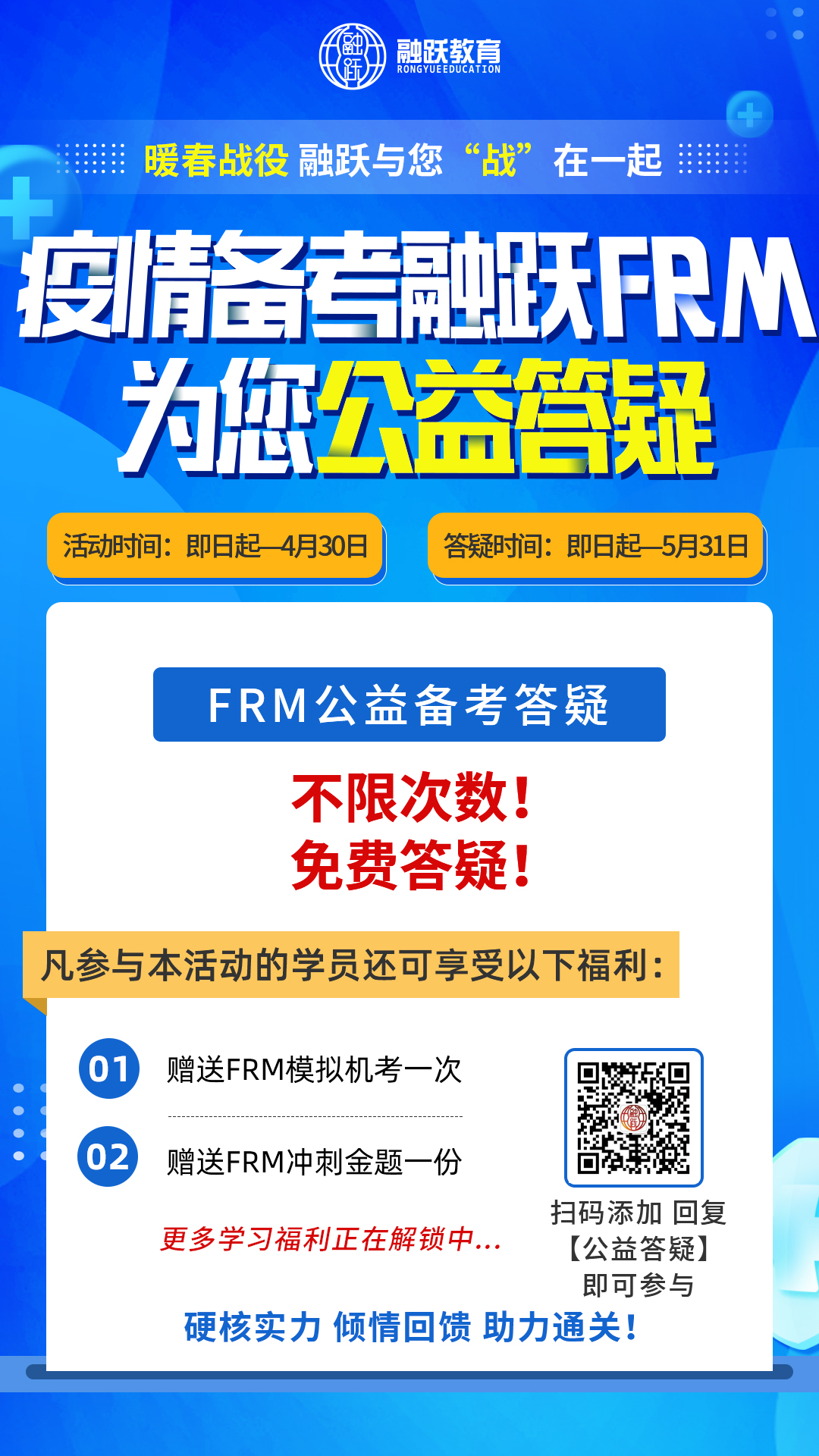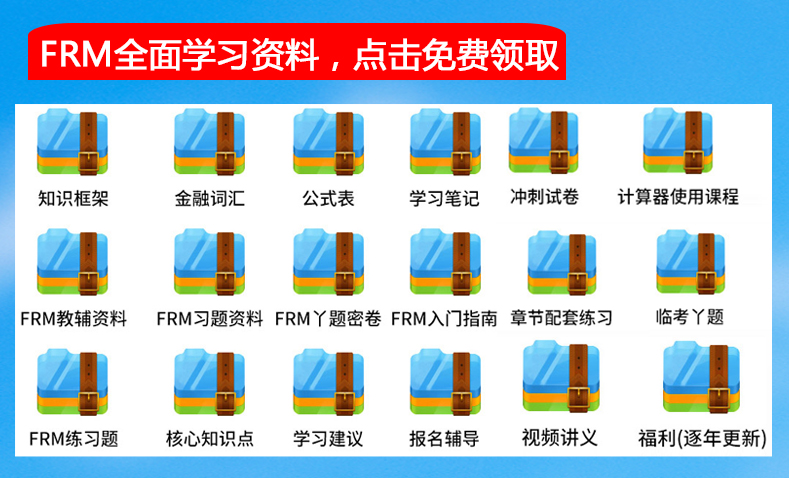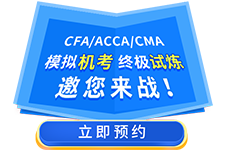在备考FRM考试中对于真题的练习是很有必要的,尤其是近几年的FRM真题,下文是小编列举的相关真题,希望对备考的你有所帮助!
》》》2022年新版FRM一二级内部资料免·费领取!【精华版】
Which of the following would not generally decrease credit risk?
A) Entering into an interest-rate swap with a counterparty
B) Signing a legally-binding netting agreement covering a portfolio of OTC derivative trades with a counterparty
C) Clearing an existing trade through a clearing house
D) Purchasing a credit derivative from aAAA-rated institution that pays USD 5 million if a bond defaults
答案:A
解析:A is correct. Entering into an interest rate swap causes the firm to be exposed to the credit risk of the swap counterparty.
B is incorrect. Netting agreements are one of the most powerful ways for controlling exposures. The purpose of these agreements is to provide for netting of payments across a set of contracts.
C is incorrect. Executing a trade through a clearing house will generally decrease credit risk. The counterparty to the contract is now the clearinghouse. Most clearinghouses are well capitalized and their risk of default is effectively zero.
Which of the following statements regarding counterparty credit risk are correct?
Ⅰ.Expected positive exposure is the highest expected exposure over a specified interval.
Ⅱ.Wrong-way exposures are positively correlated with the counterparty’s credit quality.
Ⅲ.Credit triggers are early settlement agreements that require counterparties to settle and terminate trades if the credit rating of a party falls below a specified level.
Ⅳ.Right-way exposures are negatively correlated with the counterparty’s credit quality.
Ⅴ.Cross-product netting is a provision that allows counterparties to net payments across different products.
Ⅵ.Collateral agreements require that specified amounts of liabilities be transferred to counterparty if exposures exceed a specified threshold.
A) III and V only.
B) I, III, and V.
C) I, II, and IV.
D) III, V, and VI.
答案:A

解析:Credit triggers are early settlement agreements that require counterparties to settle and terminate trades if the credit rating of a party falls below a specified level. Cross-product netting is a provision that allows counterparties to net payments across different products. Expected positive exposure is the average expected exposure over a specified interval. Wrong-way exposures are negatively correlated with the counterparty’s credit quality Right-way exposures are positively correlated with the counterparty’s credit quality. Collateral agreements require that specified amounts of assets be transferred to a counterparty if exposures exceed a specified threshold.
如果想要获得更多关于FRM考试的真题解析,点击在线咨询或者添加融跃老师微信(rongyuejiaoyu)!
- 报考条件
- 报名时间
- 报名费用
- 考试科目
- 考试时间
-
GARP对于FRM报考条件的规定:
What qualifications do I need to register for the FRM Program?
There are no educational or professional prerequisites needed toregister.
翻译为:报名FRM考试没有任何学历或专业的先决条件。
可以理解为,报名FRM考试没有任何的学历和专业的要求,只要是你想考,都可以报名的。查看完整内容 -
2024年5月FRM考试报名时间为:
早鸟价报名阶段:2023年12月1日-2024年1月31日。
标准价报名阶段:2024年2月1日-2024年3月31日。2024年8月FRM考试报名时间为:
早鸟价报名阶段:2024年3月1日-2024年4月30日。
标准价报名阶段:2024年5月1日-2024年6月30日。2024年11月FRM考试报名时间为:
早鸟价报名时间:2024年5月1日-2024年7月31日。
标准价报名时间:2024年8月1日-2024年9月30日。查看完整内容 -
2023年GARP协会对FRM的各级考试报名的费用作出了修改:将原先早报阶段考试费从$550上涨至$600,标准阶段考试费从$750上涨至$800。费用分为:
注册费:$ 400 USD;
考试费:$ 600 USD(第一阶段)or $ 800 USD(第二阶段);
场地费:$ 40 USD(大陆考生每次参加FRM考试都需缴纳场地费);
数据费:$ 10 USD(只收取一次);
首次注册的考生费用为(注册费 + 考试费 + 场地费 + 数据费)= $1050 or $1250 USD。
非首次注册的考生费用为(考试费 + 场地费) = $640 or $840 USD。查看完整内容 -
FRM考试共两级,FRM一级四门科目,FRM二级六门科目;具体科目及占比如下:
FRM一级(共四门科目)
1、Foundations of Risk Management风险管理基础(大约占20%)
2、Quantitative Analysis数量分析(大约占20%)
3、Valuation and Risk Models估值与风险建模(大约占30%)
4、Financial Markets and Products金融市场与金融产品(大约占30%)
FRM二级(共六门科目)
1、Market Risk Measurement and Management市场风险管理与测量(大约占20%)
2、Credit Risk Measurement and Management信用风险管理与测量(大约占20%)
3、Operational and Integrated Risk Management操作及综合风险管理(大约占20%)
4、Liquidity and Treasury Risk Measurement and Management 流动性风险管理(大约占15%)
5、Risk Management and Investment Management投资风险管理(大约占15%)
6、Current Issues in Financial Markets金融市场前沿话题(大约占10%)查看完整内容 -
2024年FRM考试时间安排如下:
FRM一级考试:
2024年5月4日-5月17日;
2024年8月3日(周六)上午;
2024年11月2日-11月15日。FRM二级考试:
2024年5月18日-5月24日;
2024年8月3月(周六)下午;
2024年11月16日-11月22日。查看完整内容
-
中文名
金融风险管理师
-
持证人数
25000(中国)
-
外文名
FRM(Financial Risk Manager)
-
考试等级
FRM考试共分为两级考试
-
考试时间
5月、8月、11月
-
报名时间
5月考试(12月1日-3月31日)
8月考试(3月1日-6月30日)
11月考试(5月1日-9月30日)









